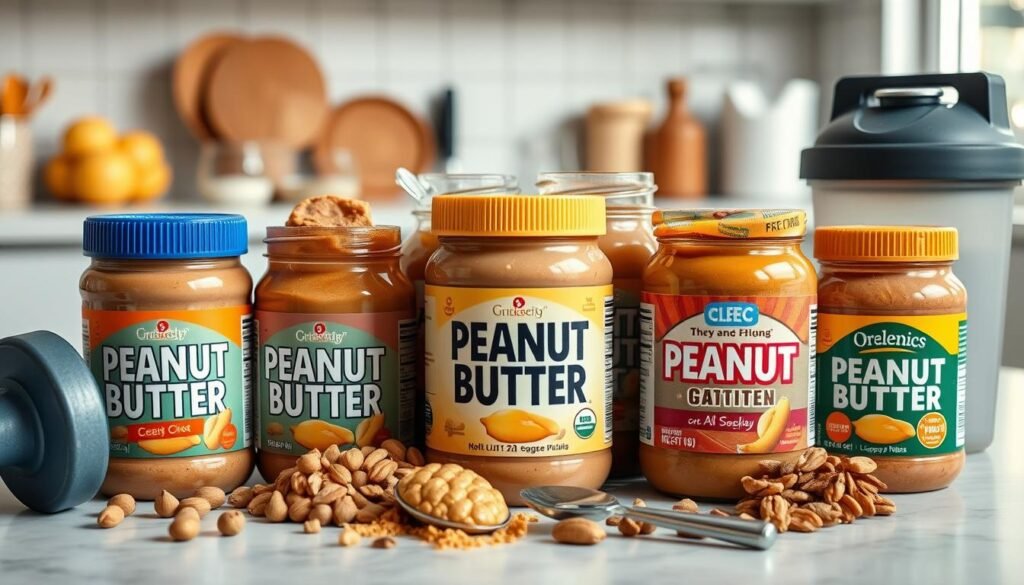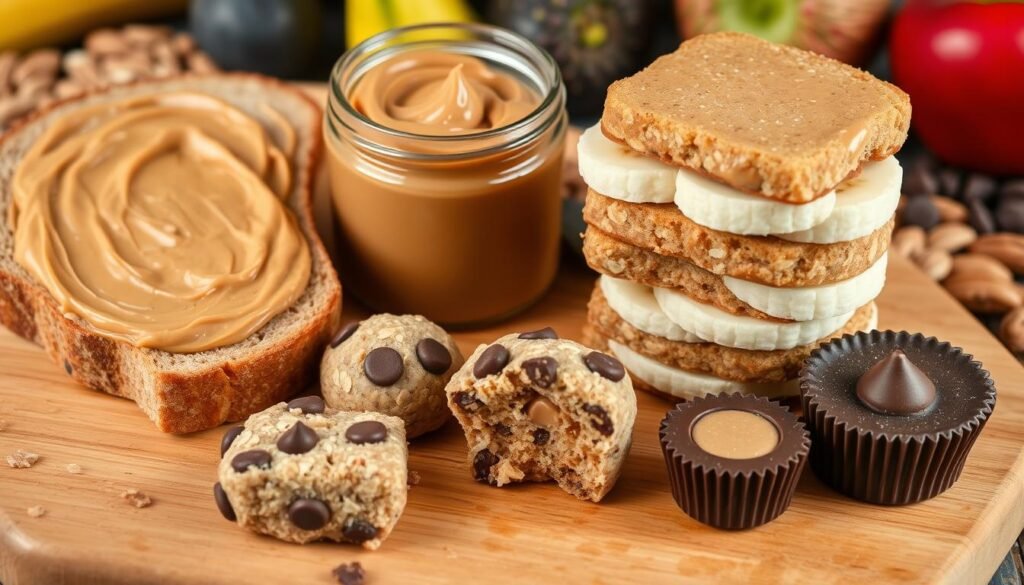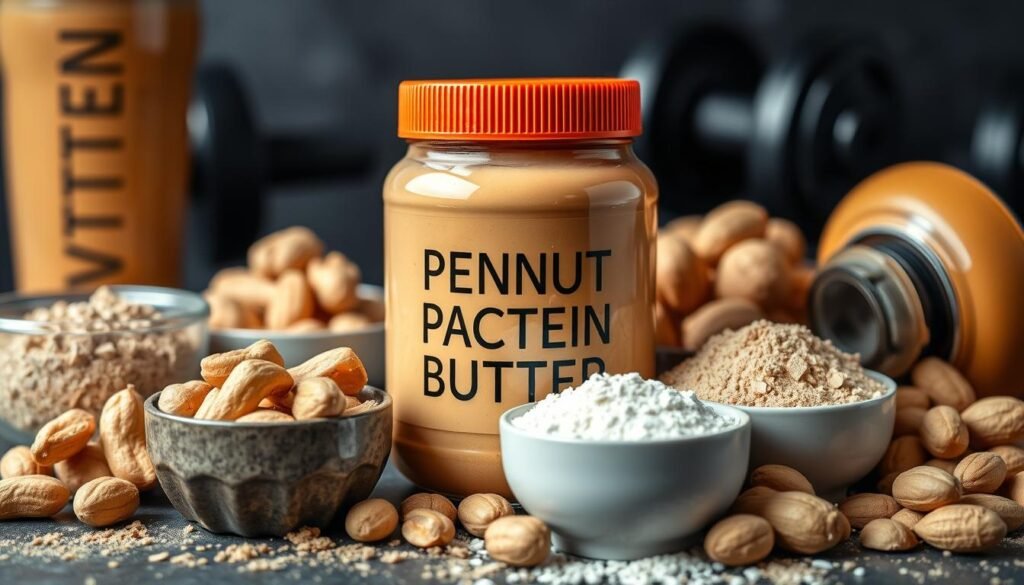Did you know peanut butter has 8 grams of protein in just 2 tablespoons? It’s often overlooked in muscle-building diets. But, for those wanting natural muscle gains, peanut butter is key. It’s not just about healthy weight gain. It’s also affordable and nutritious.
Peanut butter is both cheap and full of calories. With 100 calories per tablespoon and costing about $0.07, it’s easy on the wallet. It helps you eat more calories, crucial for muscle growth. Plus, it’s packed with nutrients like magnesium, zinc, and iron. These minerals are vital for your muscles.
Adding peanut butter to your diet could be what you need for better bulking results. It could help you get the body and strength you want.
Key Takeaways
- Peanut butter provides 8 grams of protein per 2 tablespoons.
- It facilitates healthy weight gain with its high-caloric density.
- This nutrient-dense food is budget-friendly, costing only about $0.07 per tablespoon.
- Essential minerals like magnesium, zinc, and iron found in peanut butter support muscle function and recovery.
- Natural peanut butters often have fewer ingredients, avoiding added sugars and unhealthy oils.
Understanding Bulking and Muscle Growth
Bulking is a key strategy in bodybuilding. It focuses on gaining body weight and muscle. You eat more and train hard to create a calorie surplus. Muscle growth and good nutrition are vital for success.
What is Bulking?
Bulking means you aim to slowly gain weight. About 1 pound a week is suggested. For newbies, gaining 1-2 pounds weekly is okay without adding too much fat. Weight gain diets have helped people like Marco add over 70 pounds. They used this method to better their physique.
The Importance of Muscle Hypertrophy
Muscle hypertrophy happens when your muscles grow from resistance training. This training causes tiny tears in muscles that need repair. Proper nutrition is key, as it helps you recover by meeting your caloric and protein needs. Strive for 1 gram of protein per pound of body weight. Peanut butter is a great food choice for its nutrients.
While bulking, knowing that a small weight gain, like 2-3 pounds in the first week, can help muscle growth. Keeping a daily calorie surplus of 250-500 calories is important for steady progress.
Peanut Butter: A Nutrient-Rich Food
Peanut butter is known for its high nutrition value, especially for muscle growth. It’s packed with macronutrients, vitamins, and minerals. This makes it a key food for those looking to bulk up. It not only gives you energy but also meets many nutrient needs.
Macros Breakdown of Peanut Butter
The nutrition of peanut butter shows a good mix of protein, fat, and carbs:
| Macronutrient | Amount per 100g |
|---|---|
| Calories | 567 Kcal |
| Protein | 25.8g |
| Total Fat | 49.24g |
| Carbohydrates | 16.13g |
| Dietary Fiber | 8.5g |
A lot of the calories in peanut butter come from fats. But these are mostly healthy, monounsaturated fats. They’re important for health and muscle growth.
Vitamins and Minerals in Peanut Butter
Peanuts are full of important vitamins and minerals. These are essential for athletes to perform well and recover. The nutrients in peanut butter include:
- Magnesium – 57 mg per serving, contributing 14% of the daily value.
- Zinc – 0.85 mg per serving, offering 10.6% of the daily intake for women.
- Vitamin E – A crucial antioxidant that supports muscle health.
- B Vitamins – Including niacin and vitamin B-6, aiding in energy metabolism.
These vitamins and minerals help with muscle repair and recovery. They confirm peanut butter’s place in a muscle-building diet.
Peanut Butter for Bulking: Benefits of Incorporation
Adding peanut butter to a bulking diet offers many advantages. It helps those trying to gain weight meet their calorie needs easily. This food is full of essential nutrients and makes getting more calories simple, without having to eat a lot. It’s key to know how peanut butter aids muscle growth when bulking up.
High-Caloric Density for Easy Caloric Surplus
Peanut butter benefits for bulking include its high calorie count. A 100-gram serving packs about 597 calories, making it a great energy source. It offers as much protein as beef but with more calories from fat. This makes it easy to eat more calories without feeling stuffed.
Just two tablespoons of peanut butter give you about 188 calories and 7 to 8 grams of protein. It’s simple to add to meals or snacks. This way, reaching a caloric surplus for bulking is easier.
Healthy Fats to Support Muscle Growth
Peanut butter is also full of good fats. These fats are important for muscle growth and help make hormones. The monounsaturated fats in peanut butter are good for your heart too. This supports your overall health.
Healthy fats are vital for keeping hormone levels steady and improving muscle recovery post-workout. Peanut butter also has Vitamin E and magnesium. These nutrients support muscle function and health, fitting well with fitness goals.
Peanut butter is a top choice for those bulking up. It integrates easily into daily meals and offers essential nutrients and great taste. It can make any bulking plan better.
Best Peanut Butter Options for Bulking
When picking peanut butter for bulking, your choice greatly matters. The right kind of peanut butter can increase your calorie intake and help muscles grow. You have two main options: natural peanut butter and processed brands. Knowing their differences is key to a wise choice.
Choosing Natural Peanut Butter
Natural peanut butter is simply ground peanuts without extra oils, sugars, or preservatives. It’s packed with good nutrients and healthy fats. It also has about 25% protein, giving you 8 grams per two tablespoons. This makes it a top pick for bulking up.
It’s also calorie-dense, with 190 calories per serving, letting you get more energy without feeling too full. Plus, it has about 2 grams of dietary fiber per serving. This is great for your digestive system, especially when you’re bulking.
Why Avoid Processed Brands?
Processed brands often add sugars, unhealthy fats, and preservatives. These additions harm peanut butter’s healthy nature. Many don’t have the 90% peanuts needed to be considered true peanut butter. They’re more like peanut butter spreads and not as nutritious. Going for natural peanut butter means better quality and can help keep your testosterone levels up. This is important for muscle growth.
Choosing natural lets you meet your calorie and nutrition needs well. Meanwhile, you steer clear of the downsides of processed options.
| Type of Peanut Butter | Ingredients | Protein (g) | Calories (per 2 tbsp) | Dietary Fiber (g) |
|---|---|---|---|---|
| Natural Peanut Butter | 100% Peanuts | 8 | 190 | 2 |
| Processed Brands | Additives, Sugars, Oils | Varies | Varies | Varies |

How to Use Peanut Butter for Bulking
Peanut butter is a great ally for gaining muscle. It’s all about knowing how to use it right to bulk up. It’s important to eat it at the best times and watch how much you eat. By doing these things, you ensure you get the right amount of calories and nutrients.
Optimal Timing for Consumption
When you eat is key for muscle growth. Eat peanut butter within 15 to 30 minutes after working out to help recovery and growth. Add a carb to make it even better. A peanut butter and banana sandwich is an awesome choice providing calories, carbs, and protein. It’s perfect for after exercising.
Portion Sizes to Consider
How much peanut butter you eat is crucial. A two-tablespoon serving gives you about 190 calories and 8 grams of protein. It’s best to stick to no more than 3.5 ounces a day to not eat too many calories. Eating the right amount can help manage your calorie intake. A peanut butter sandwich, for instance, can be a low-calorie snack option.
For more tips on using peanut butter in your diet, check out this guide.
Peanut Butter Nutrition for Bulking
Understanding peanut butter’s nutritional value is key for effective bulking strategies. It’s not just tasty; it helps with muscle repair and boosts calorie intake as well. Comparing the calories in peanut butter with other foods helps in making smart diet choices.
The Role of Protein in Muscle Repair
Protein is vital for repairing muscles after tough workouts. With about 8 grams of protein per two tablespoons, peanut butter aids recovery. It’s crucial for fixing muscles that exercise damages. Blending peanut butter with protein-rich foods like Greek yogurt or cottage cheese can improve muscle recovery even more.
Calorie Content Comparison with Other Foods
Peanut butter is a nutrient-rich food choice, offering about 191 calories in a typical serving. These come mainly from healthy fats and protein. Here’s how peanut butter compares to other popular foods:
| Food Item | Calories | Protein (g) | Carbs (g) | Fat (g) |
|---|---|---|---|---|
| Peanut Butter (2 tbsp) | 191 | 8 | 7 | 16 |
| Peanut Butter Pancakes (1 serving) | 207 | 21 | 24 | 3 |
| Peanut Butter Greek Yogurt (1 serving) | 192 | 20 | 9 | 9 |
| Chocolate Peanut Butter Cottage Cheese (1 serving) | 327 | 35 | 15 | 14 |
| Peanut Butter-Banana-Cocoa Smoothie | 624 | 38 | 68 | 22 |
Peanut butter’s high calorie and balanced nutrient mix make it great for healthy weight gain and muscle growth. This shows why incorporating peanut butter into a bulking diet is smart, ensuring each calorie works towards fitness goals.
Peanut Butter Recipes for Bulking
Adding peanut butter to daily meals helps with bulking goals. It’s a flexible ingredient that makes meals yummy and nourishing. Check out two simple ways to use it for more muscle.
Peanut Butter Smoothies for a Post-Workout Boost
Peanut butter smoothies are great after exercise. They help your body recover. Try these tasty options:
-
Chocolate Peanut Butter Shake:
- Calories: 587
- Protein: 30 grams
- Fat: 23 grams
- Carbs: 65 grams
-
Triple Berry Smoothie:
- Calories: 491
- Protein: 26 grams
- Fat: 23 grams
- Carbs: 45 grams
-
1,000-Calorie Smoothie:
- Calories: 1,100
- Protein: 69 grams
- Fat: 36 grams
- Carbs: 125 grams
No-Bake Energy Bites and Other Snacks
No-bake energy bites are quick and simple. They blend peanut butter’s flavor with energizing ingredients. Here’s a simple recipe to start:
- 1 cup peanut butter
- 1/2 cup honey
- 1 cup oats
- 1/4 cup chocolate chips
Mix the ingredients and shape into small balls. Chill them. It’s a quick peanut butter treat that’s also nutritious.
| Recipe | Calories | Protein | Carbs | Fat |
|---|---|---|---|---|
| Chocolate Peanut Butter Shake | 587 | 30 grams | 65 grams | 23 grams |
| Triple Berry Smoothie | 491 | 26 grams | 45 grams | 23 grams |
| 1,000-Calorie Smoothie | 1,100 | 69 grams | 125 grams | 36 grams |
| No-Bake Energy Bites | Approx. 90 (per bite) | 3 grams | 12 grams | 4 grams |
Peanut Butter Snacks for Bulking
Looking to bulk up? Finding the right snacks is key. Peanut butter snacks offer tasty, nutrient-rich options. They’re high in calories and protein. Perfect for those trying to up their calorie intake, aiming for 3,200 to 3,800 a day.
Quick Snack Ideas with Peanut Butter
Need quick snack ideas with peanut butter? Check these out. They’re not just filling but also packed with nutrients for muscle growth:
- Peanut butter and banana on whole wheat toast: Healthy fats meet carbs.
- Peanut butter mixed with Greek yogurt: It’s high in protein and creamy.
- Peanut butter energy balls with oats and honey: Calorie-dense and easy to make.
- Trail mix with peanut butter, nuts, dried fruit: Packed with energy for on-the-go.
- Peanut butter and cottage cheese with pineapple: A nice mix of protein and carbs.
Pairing Peanut Butter with Other Foods for Optimal Gains
Peanut butter pairs well for added taste and nutrients. These combos offer high-calorie snacks perfect for bulking. Check out these nutritious options:
- Avocado and peanut butter on whole grain bread: Over 300 calories of healthy fats.
- Hard-boiled eggs with peanut butter: Packs more than 20 grams of protein.
- Peanut butter smoothies: Mix with full-fat milk or yogurt for 600 to 800 calories.
- Peanut butter hummus: Serve with whole-grain crackers for a tasty, nutrient-packed snack.
- Peanut butter and canned tuna: Mixed with olive oil for a high-calorie, protein-rich meal.

With these peanut butter snacks, bulking can be both effective and delicious. Explore various flavors and textures. For more on high-protein snacks, visit this resource. It’s your guide to maximizing calorie intake with nutritious, tasty food for muscle growth.
Peanut Butter Smoothie for Bulking
Making a peanut butter smoothie for bulking requires picking the right ingredients. You want to maximize muscle growth and recovery. A good smoothie fills you up and fuels your active days. Here are tips for balanced smoothies aimed at building muscle.
Creating a Balanced Bulking Smoothie
When making a peanut butter smoothie for bulking, mix high-protein foods with healthy carbs and fats. This mix gives you many calories and great nutritional value. To make the perfect smoothie, follow these tips:
- Use dairy or fortified plant-based milk for protein and calcium.
- Add a scoop of chocolate protein powder for extra protein.
- Incorporate rolled oats for fiber and energy.
- Include a banana or frozen berries for sweetness and vitamins.
- Mix in one tablespoon of peanut butter or peanut powder for flavor and healthy fats.
Key Ingredients for Best Results
Picking the right ingredients is key to making a great muscle-building smoothie. Let’s review the nutrients and what they offer per serving:
| Nutrient | Amount per Smoothie |
|---|---|
| Calories | 593 kcal |
| Total Carbohydrates | 50 g |
| Total Protein | 47 g |
| Total Fat | 27 g |
| Saturated Fat | 8 g |
| Polyunsaturated Fat | 4 g |
| Monounsaturated Fat | 10 g |
| Cholesterol | 82 mg |
| Sodium | 300 mg |
| Potassium | 1129 mg |
| Dietary Fiber | 5 g |
| Total Sugars | 33 g |
| Vitamins & Minerals | Varies |
This peanut butter smoothie boosts your energy. It’s great for breakfast or after a workout. Adding these ingredients lets you customize your nutrition to your bulking goals. You’ll get a powerful blend that supports muscle growth and health.
The Impact of Peanut Butter Protein for Bulking
Peanut butter is a great source of protein for those looking to bulk up. It’s important to understand how proteins help with muscle growth. While peanut butter has protein, it misses some essential amino acids. To make the most of it, mixing with other proteins is key.
Understanding Complete Proteins
Complete proteins have all nine essential amino acids we need. Peanut butter has 22 grams of protein per 100 grams but lacks in lysine. To use peanut butter for bulking, add lysine-rich foods like dairy or legumes. This makes your meals more balanced and helps your muscles recover and grow.
Combining Peanut Butter with Other Proteins
Combining different proteins increases the variety of amino acids you get. For better muscle development, mix peanut butter with foods high in protein, such as Greek yogurt. For instance, peanut butter in a whey protein smoothie tastes great and boosts protein quality. These combos are crucial for reaching protein goals when bulking.
Basically, peanut butter gives you energy and adds to your protein count. But, it’s best when paired with complete proteins. By doing this, you support your nutritional needs well.

| Protein Source | Protein Content (g) | Amino Acid Profile |
|---|---|---|
| Peanut Butter (100g) | 22 | Incomplete (low in lysine) |
| Greek Yogurt (100g) | 10 | Complete |
| Whey Protein (30g) | 24 | Complete |
| Black Beans (100g) | 21 | Incomplete (low in methionine) |
Conclusion
Peanut butter is a great choice for anyone looking to bulk up and gain muscle. It’s rich in nutrients, with a two-tablespoon serving offering about 190 calories and healthy fats. This makes it simple to eat more calories than you burn.
Choosing natural peanut butter means you get all the good stuff without unwanted sugars and extras found in processed types. It’s packed with protein, which is key for muscle repair and growth. Studies also show that nuts, like those in peanut butter, are good for your health.
This spread isn’t just good for adding calories. It has a low glycemic index and lots of minerals, making it great for workout fuel and your overall health. For the best results in bulking up, eat foods rich in nutrients like peanut butter.
To reach your bulking goals, remember the importance of eating right. Adding peanut butter to your diet is a smart move. It shows that eating quality foods is crucial in any fitness plan.